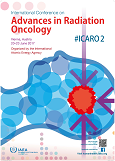Speaker
Rajiv Prasad
(IAEA)
Description
BACKGROUND AND CONTEXT
In many low income countries, the number of existing radiotherapy centers is insufficient, equipment is often outdated, and there is a dearth of training opportunities for professionals. Many centers work in isolation with limited access to up-to-date published literature, international meetings, and expert opinion. Telemedicine can be used for closing this gap and providing best possible expert advice and patient care.
AIM
The IAEA established Africa Radiation Oncology Network (AFRONET) in June 2012 as a pilot project for Anglophone African countries. The purpose of AFRONET is to strengthen the process of clinical decision-making in radiotherapy centres in Anglophone African countries.
The AFRONET project was established as a multi-disciplinary virtual tumor boards (VTB) where cancer professionals present, discuss and review challenging cancer cases. A secondary objective was to upgrade the knowledge of radiation oncology residents. It provides a unique opportunity for participating centers to present and discuss cases with experts (from within and outside Africa) both as an academic exercise, and a way to support an evidence –based management approach.
STRATEGY/TACTICS
AFRONET meetings are held once monthly using the WebEx platform. The agenda includes case presentations, and a presentation on pre-announced topic of common interest and relevance. Open-discussion is allowed to facilitate decision-making and/or as educational exercise. After the meeting, minutes along with copies of the presentations are circulated to participants for further comments, suggestions and ready reference.
PROGRAM/POLICY PROCESS
The project was intended to test the feasibility of the platform to deliver VTB in the real conditions prevailing in African countries. A feedback survey showed positive results, and it was decided to continue the project in its present form. Based on the success of the project and experience gained, such VTB are being planned for other regions (Francophone Africa, Asia-Pacific, Latin-America), and in other languages (French and Spanish). Development of a dedicated website is under consideration for promoting open-access. Furthermore, new software tools will be included in order to facilitate and support contouring and plan review exercises. Support from professional/academic bodies and other organizations is being sought to increase impact and render this endeavour more meaningful.
OUTCOMES
Since June 2012 to April 2016, 44 monthly AFRONET meetings were held. The average number of participating centers per meeting was 9 (range 3-14).
A total of 121 cases (2.75 per meeting) were presented for discussion, according to table 1.
Sarcoma 19
Breast 16
Genito-urinary 15
Central Nervous System 14
Gynecologic 13
Head and Neck 12
Lymphoma 7
Lung 7
Gastr-intestinal 5
Neuroendocrine tumors 4
Carcinoma Unknown Primary 3
Skin 3
Miscellamea 4
WHAT WAS LEARNED
• In Anglophone African countries VTB is feasible and acceptable
• Most cases present in advanced stages in young patient’s age (Mean age: 34)
• HIV positive cases represented 7% of the total
• Access to pathology, imaging, endoscopy and specialized surgery is challenging in many African countries
• Management questions discussed were not limited to radiotherapy
• Participation of other allied medical disciplines (pathology, imaging) would be useful
• Most professionals in Anglophone African countries work as Clinical Oncologists, delivering both radiotherapy and chemotherapy.
• Some participating centers offer 2D radiotherapy only
• Many patients need palliative care
• Reliable internet connection remains challenging in many African countries, although use of mobile technology can address this challenge
• The broad exposure to a much wider spectrum of cancers and cancer-associated conditions is of interest and potential benefit to the advisory panels too
| Institution | International Atomic Energy Agency |
|---|---|
| Country | Austria |
Primary author
Rajiv Prasad
(IAEA)
Co-authors
Mr
Alfredo Polo
(IAEA)
Eduardo Rosenblatt
(IAEA)
Eduardo Zubizarreta
(IAEA)
Gerald Paris
(Tygerberg Hospital. Tygerberg, Bellville, South Africa)
Kirsten Hopkins
(IAEA)
M.S. Zaghloul
(Children's Cancer Hospital & National Cancer Institute, Cairo University, Cairo, Egypt)
May Abdel-Wahab
(IAEA)
N Ndlovu
(Radiotherapy Department, Parirenyatwa Group of Hospital. Harare, Zimbabwe)
V Sharma
(Charlotte Maxeke Johannesburg Academic Hospital. Department of Radiation Oncology. Johannesburg, South Africa)

